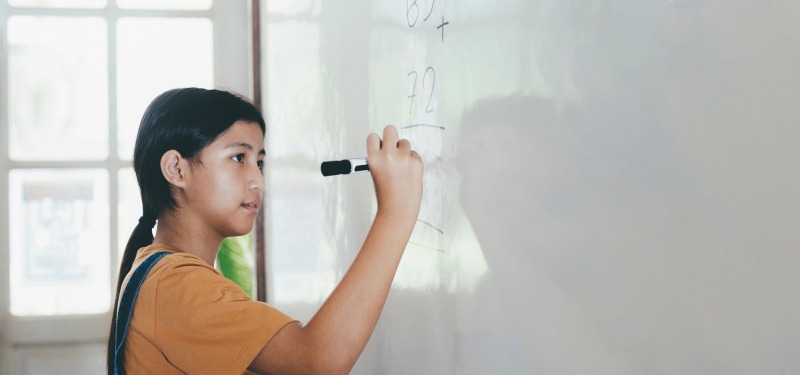Why You Should Encourage Confidence in Learning

Understanding lessons plays a big part in boosting a child’s self-esteem, especially if they are in a more academic-oriented environment. So what happens when they fail? They may feel frustrated or upset, and end up reluctant to participate in lessons or even take part in the trial-and-error process that is entwined with learning, especially in mathematics.
Encouraging confidence in learning helps students develop a mindset focused on growth. Instead of focusing on whether they ‘can’ or ‘cannot’ do it, they take on a more positive attitude towards their own process. This gives them a chance to break free from the belief that some students just have an innate ability to be smart. Read more about the qualities that are reflected in a confident learner:
1. They value mistakes
The fear of making mistakes is one of the greatest obstacles to learning. Most students worry about the consequences of getting the wrong answer, such as being made fun of by classmates or being chastised by adults. They hesitate in trying out new strategies or even voicing out their answers. A confident learner takes it all in stride, allowing their brain to develop further (read more about it here) and taking in new problem-solving methods. They are willing to take risks as they understand that they gain something, even if they don’t get it right the first time.
2. They have perseverance
Low confidence in learning is seen when students get frustrated or give up if they find lessons too challenging. On the other hand, students who see themselves as ‘smart’ would believe that any struggle they face is a sign that they are not, which can lead to them avoiding more difficult work. Perseverance is necessary for them to look at challenges in a different way, as a chance to learn and improve. Obstacles in learning are inevitable. Therefore, it is important that they keep trying and figuring out what works.
3. They’re independent
Students who are confident will not wait for the teacher to give them an answer to questions. They’ll try to figure it out themselves and find the process engaging. They don’t seek approval, and when stumped, take charge to find out what they don’t understand. To put it simply, these kids do not wait to be spoon-fed knowledge. Instead, they embark on an adventure to see what they can learn and what they can do with the knowledge.
How do we encourage confidence?
Building confidence in students lies in both the parents and teachers. Students need to get the idea that they can learn something, even if they feel like they are not good at it. In the classroom, teachers need to ensure that the students are in a positive learning environment. Students need realistic learning goals that are created based on their own strengths and weaknesses. Otherwise, they will find school to be a source of misery and boredom.
At home, building a child’s intrinsic motivation is very important. Parents can help children gain more positive experiences with learning by taking interest in their lessons. A short chat about their day at school and a few questions to help them recall their classes can do wonders. Putting what they learnt into practice in their daily life can create relevance. Try asking them to cut a cake in half, then in quarters when it comes to fractions, or observe the clouds for rain if they learnt it in science.
Encouraging confidence in some subjects, such as maths, can be challenging when the child shows a lack of interest or reluctance. Set them up with Maths in My Life, our three-day workshop where they can get inspired to apply mathematical concepts to things around them.









